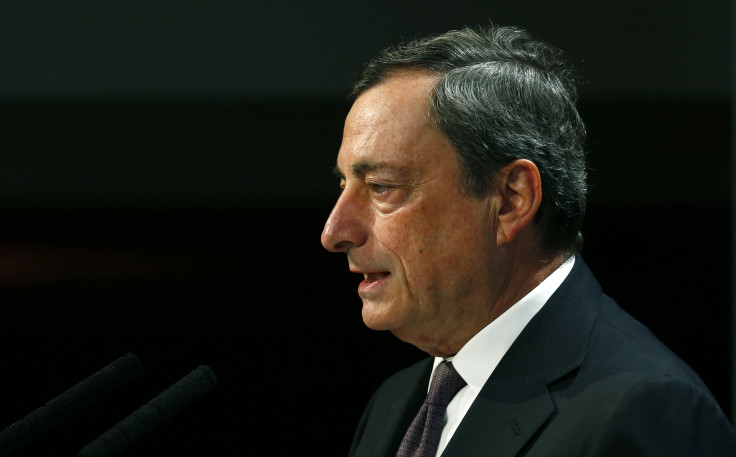Eurozone Economy: Draghi Expected To Unveil Fresh Stimulus To Boost Inflation, Growth

UPDATE: 7:47 a.m. EST -- The European Central Bank announced Thursday that it will reduce the deposit rate on reserves held at the central bank by 10 basis points to -0.3 percent, effective from Dec. 9. Further monetary policy measures will be announced by ECB chief Mario Draghi during a press conference at 8:30 a.m. EST.
Original story:
On Thursday, all eyes will turn to the European Central Bank’s monthly monetary policy meeting in Frankfurt, Germany, where ECB chief Mario Draghi is expected to inject fresh stimulus into the eurozone economy. Prospects of the ECB easing its purse strings further were stoked by the Eurostat’s estimate of inflation data released Wednesday, which showed a weaker-than-expected rise in consumer prices in November.
Additional ECB easing would underscore a marked divergence from the U.S. Federal Reserve, which, later this month, is widely expected to hike rates held at record-low levels for nearly a decade. In recent weeks, this expected divergence, coupled with dovish comments from Draghi, has significantly weakened the euro, which recently fell to a seven-month low of $1.0566.
The euro was last at $1.0591 at 12:43 a.m. EST.
“It is difficult to see a clear market consensus on what 'Santa Mario' should bring on Thursday,” Carsten Brzeski, the chief economist at ING, told CNBC.
There are two ways the ECB could inject fresh capital into the eurozone economy. It can either expand its massive 1.1 trillion euro ($1.2 trillion) Quantitative Easing (QE) program, which is currently slated to run at least through September 2016, or it could further slash the deposit rate on reserves held at the central bank, which currently stands at -0.2 percent.
Analysts’ predictions range from a conservative 10 basis point cut in deposit rates, a 10 billion euro ($10.6 billion) rise in monthly bond purchases and a three-month extension of QE, to a more extreme 20 basis point cut, 25 billion euro ($26.5 billion) hike in monthly purchases and a six-month extension.
“One of the reasons why the ECB is so keen on cutting the deposit rate is it is such a very effective tool for weakening the currency,” Jack Kelly, head of government bond funds at Standard Life Investments, told the Wall Street Journal. “Probably more so than the asset purchase program.”
A cheaper euro is a prerequisite for boosting inflation in the 19-nation bloc, which is currently at 0.1 percent at an annual basis -- much below the ECB’s 2 percent goal. A weak exchange rate also makes exports more competitive at a time cooling demand in emerging markets, especially China, has hurt eurozone economies.
© Copyright IBTimes 2024. All rights reserved.





















